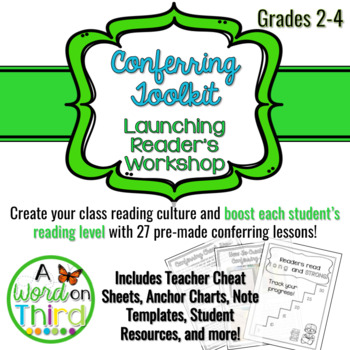Teaching points are the meat of your conferences and strategy group lessons. Today we're talking about how we deliver the teaching in your conferences for maximum effect.
Here are 5 different ways you can provide direct instruction, in order from least supported to most supported.
Inquiry Lesson
I love designing inquiry lessons because they are so empowering for students! Basically, you provide students with high quality samples of the skill you're teaching, and let them name the skill by examining the samples. Teaching crafting strategies? Provide a well-crafted passage from a favorite author and let the kids figure out what crafting strategies the author used. Teaching how to write/think about books deeply? Provide some excellent student work (post-its or reader's notebook entries) and let the students name the thinking work those readers did.
You'll need to give some thought to your language and questioning to keep your lesson on track. If you're not getting the answers you want from kids, you still need them to do the work. You might say something like, "Nice observation! Now go deeper. What else do you notice?"
If you're doing this work on the fly, I recommend pulling work from your favorite mentor texts. Ideally you know those well (and so do the kids). It might sound like this:
"How did the author..."
"What else did the author do to..."
Remind & Coach
Guided practice is a way of delivering content is underrated among teachers in my opinion. All you do is state your teaching point ("Writers add adjectives to their writing to make their writing more interesting") and... let the students practice.
Yup, that's it.
Resist the urge to talk, model, teach, question, etc. This is just time for practice. Let kids try the skill first and only offer minimal prompting or coaching if needed. This is for students who you know can do something but just aren't doing it independently yet. It might sound like this:
"Remember how we learned that..."
"Now you try..."
Explanation & Example
This is similar to the guided practice above, but with a little added support. Show students a high quality sample (maybe an example of good writing from a mentor text), and give a short explanation of why it's useful. Basically, you're doing the naming of the skills demonstrated in the sample.
Once the students see what the author has tried, give them a chance to practice. It might sound like this:
"Do you see how the author..."
"Now you try..."
Shared Experience
Shared experience lessons are middle-of-the-road scaffolding lessons. Allowing students to participate in a shared experience gives kids a chance to practice skills they are trying to use independently. This looks different in reader's and writer's workshop.
These lessons may involve:
- interactive writing - group composes piece together, teacher shares the pen, students brainstorm content of writing, teacher prompts when writing, students can write parts of writing on dry-erase boards so everyone is active
- shared writing - group composes piece together, teacher holds the pen and students brainstorm content of writing, teacher prompts when writing
- shared reading - all eyes on one text, done over several days, lets kids work on comprehension, fluency, decoding and meaning, syntax, and visual work
- small group read aloud - think out loud about particular skill you're teaching while you're reading, give kids a chance to stop and think too, can be done over several days
Demonstration
This is the type of teaching I think we normally do in a conference. The teacher names and teaches the skill, models it, and then lets students try it. This can be with a new or familiar skill.
I'm not going to explain this one any more since it's the one most teachers are most familiar with. It might sound like this:
"Today I'm going to show you how to...""Do you see how I...""Now you try..."
I encourage you to try delivering your teaching points in a different way! Next week will be about all things active engagement!
If you're already thinking about setting up for next year like I am, make sure you go download my conferring toolkit to help you launch reader's workshop. The free product preview is a practical, easy-to-use tool that you won't want to miss out on! Click here or on the picture below to see the toolkit.
By the way, if you haven't already subscribed, we'd love to have you! Join our community by signing up in the box right under my bio to the right. That way, you won't miss any blog posts. I promise not to clutter your inbox! And make sure to follow me on Instagram for more classroom inspiration.



No comments
Post a Comment